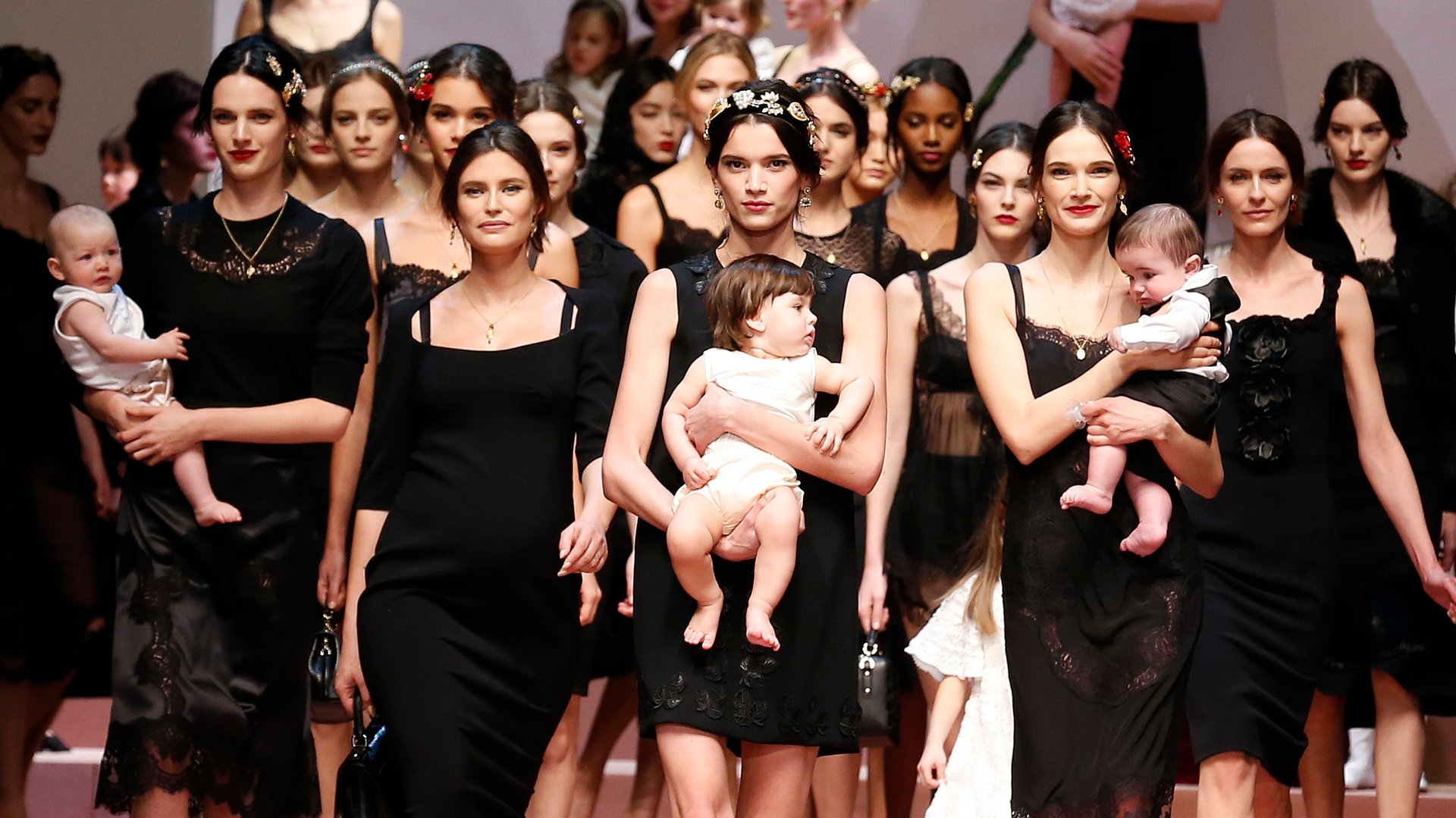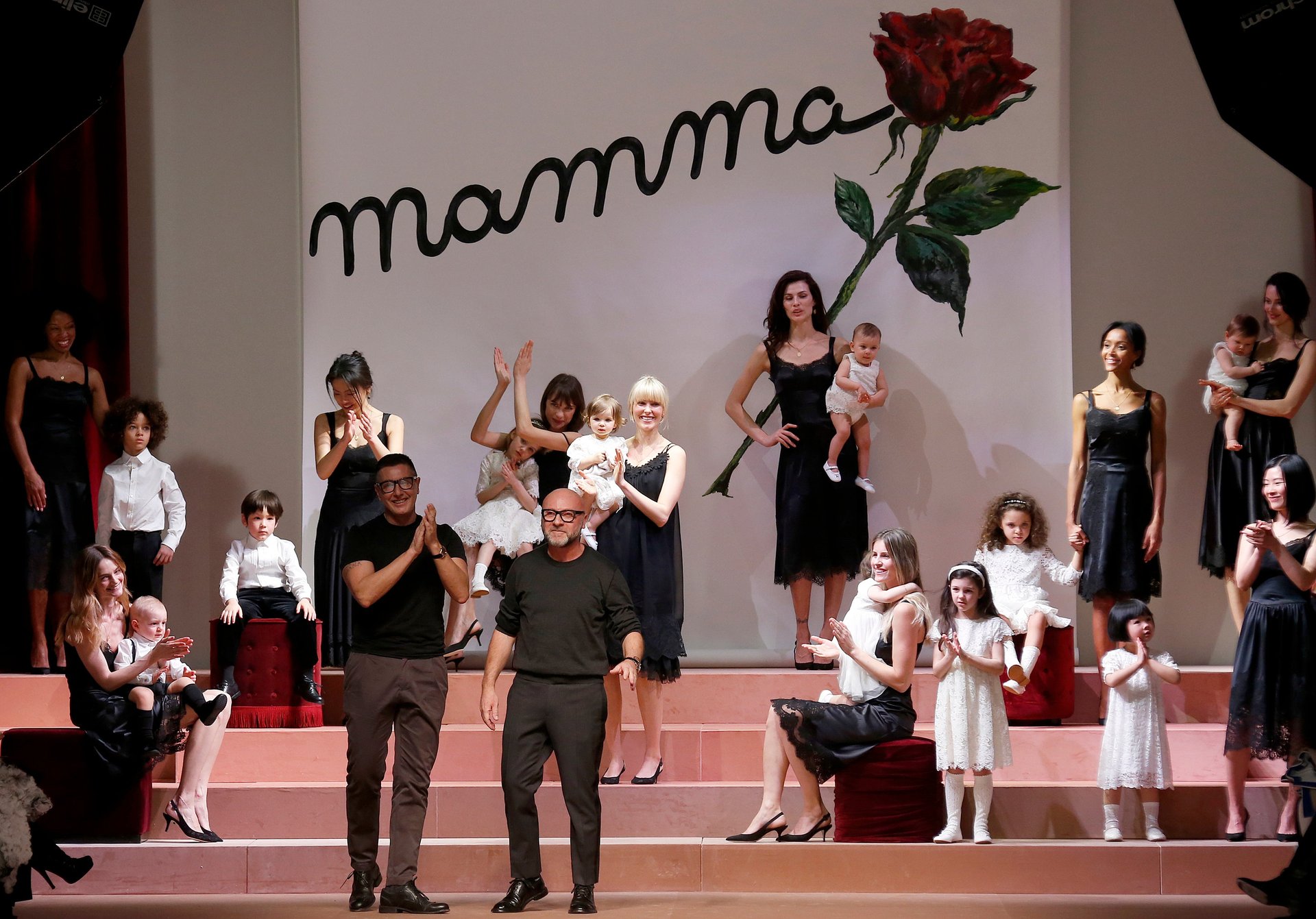I wish Dolce and Gabbana could meet my lesbian moms
The kids are controversial these days. In the lead up to oral arguments on same-sex marriage scheduled to begin at the Supreme Court on Apr. 28, opponents of same-sex couples’ freedom to marry are eagerly fanning flames. The latest in this public relations play? Comments made by Italian mega-designers Stefanno Gabbana and Domenico Dolce.


The kids are controversial these days. In the lead up to oral arguments on same-sex marriage scheduled to begin at the Supreme Court on Apr. 28, opponents of same-sex couples’ freedom to marry are eagerly fanning flames. The latest in this public relations play? Comments made by Italian mega-designers Stefanno Gabbana and Domenico Dolce.
In an interview in Italian magazine Panorama published on Mar. 12, the gay men opined, “[t]he only family is the traditional one,” and went on to make unflattering observations about the nature of assisted reproductive technologies (ART) like in vitro fertilization and artificial insemination.
Following an international backlash lead by gay father (and superstar) Elton John, Dolce and Gabbana walked their comments back two days later: “We are gay. We love gay couple. [sic] We love gay adoption.” I doubt the designers are fully aware of the impending SCOTUS hearing, but the damage had already been done. Across the US anti-LGBT activists jumped on the comments as proof that even the gays think that gays having children is a bad idea.
As the son of a same-sex couple and the product of artificial insemination, I’m genuinely glad that conservatives have such concern for my well-being and the well-being of my peers. And because this is ultimately an issue of reality not rhetoric, I’d like to take this opportunity to explain why I think it’s so important that we have these tough and occasionally awkward conversations about ART and the notion of LGBT parents, questions that people like me wrestle with as we grow up.
In the eyes of some conservatives, the billionaire designers’ comments are proof that one can be opposed to the idea of gay families or gay marriage and not be bigoted. On one hand, this is a sign of progress: the LGBT cause has grown so mainstream that even conservatives genuinely fear being labeled “anti-gay.” But while it might be easy to jump to conclusions, I do not think that claiming children need both a mother and a father, or that children need male and female role models, makes you inherently anti-gay. These attitudes often go hand-in-hand with being anti-gay, but the two are not mutually inclusive. What makes you anti-gay is disparaging others or working against their legal rights because they are gay.
Conservative arguments against gay parenting are numerous. Many of them are anchored by the belief that gender plays a defining, irreplaceable role in parenting—a role I’ve experienced to be less important than they think it is. But this belief is not, in itself, anti-gay. Conservatives, after all, have been critiquing single parenting since before the LGBT acronym existed. It’s when their arguments suggest that LGBT people are by definition more sinful than heterosexuals and are therefore more likely to negatively influence their children does that their rhetoric cross the line from different perspective to definitively anti-LGBT.
I know plenty of straight allies who have told me they think a mother and a father is probably the most suitable environment for raising children, but who also feel that it’s entirely possible for kids with same-sex parents to turn out just fine. I usually find this point of view uncomfortable, but understandable—this category of person tends to be thinking about their own parents, and what life would have been like without one of them.
I also get uncomfortable when I hear people talk about the necessity of fathers—we usually hear this rhetoric in conversations about responsibility and deadbeat dads. But I have come to realize that this is often shorthand used to advocate for invested and present parents.
A person’s sexual orientation does not in fact determine if that person will be a good parent. When I told the Iowa House Judiciary Committee that the sexual orientation of my parents had zero effect on the content of my character, this is what I was talking about. My parents are great parents not because they are gay, but because they are present and invested in my life. They taught me that our sense of family came from the commitment we made to each other—to work through the hard times so we could enjoy the good ones—and that our family is defined by the love that binds us. Not coincidentally, this is precisely the idea that conservatives are so quick to reject.
In the mid-1980s, my mother Terry decided—as lots of women do—that she wanted to have children. At the time, she was a single, lesbian woman living in a small midwestern town of about 20,00 people. (She has been with my other mom Jackie, now her wife, since 1996.)
Like any good parent should, she had a lot of doubts and asked a lot of questions before deciding to try to start her family. She conferred with her younger cousins about the potential stigma a kid growing up with a lesbian mother might face. They assured her it “wasn’t that big a deal these days.”
Not everyone agreed, including her own parents. Calls to various state and the regional fertility clinics ended in a lot of hang-ups and no thank you’s. “We don’t do illegitimate children,” she was told on more than one occasion. Finally, she found a clinic in San Francisco and a cryobank in Fairfax, Virginia that would help her.
I was a long shot—an improbable pregnancy that succeeded via artificial insemination despite one failed IVF cycle and my mother’s scarred fallopian tubes. My sister was a little more conventional, conceived with a successful IVF cycle, but she arrived so dangerously early that I nearly became an orphan at age 3.
My sister and I were told these stories, with more embellishment of course, over and over as we grew up. In fact I don’t remember a time when I didn’t understand essentially how it was I came to be. I understood, too, that though we had a biological father, my sister and I did not have a dad in our lives—we were a two-mom family. I understood that we were different, and I understood that that was okay.
There were, after all, lots of men in and around my life: uncles and cousins, male teachers, the dads of my best friends, leaders at church and in the Boy Scouts. But of course I still felt the absence of a father figure. I remember listening to “Cat’s Cradle,” the ballad about an absent father by Harry Chapin, and feeling a connection to the song’s lyrics. (Both of my mom were understandably uncomfortable with this fact, but being mature parents bought me the CD anyway.) Just a few years ago, I found a card I drew for Father’s Day in elementary school, telling my donor that I wanted him to come live with us.

It is impossible, now, to remember exactly where those feelings came from. I’m sure that part of my desire for a father figure came from the fact that my friends had dads who were awesome. And I’m sure that other parts came from some innate desire to connect with a parent who shared my gender.
But as I grew older, the desire to conform lessened, and I built strong, close relationships with other young men. Whatever absence there may have been in my life was seamlessly filled by the love, camaraderie, and support of my friends and family. My experiences have convinced me that while not all arguments against same-sex parenting are themselves homophobic, they are all simply incorrect.
And although I did not have a dad in my life growing up, I would like to be one. Like so many others, I hope to one day have children of my own, to raise them with someone I love in a home that is happy and healthy.
Is my desire for children or to be a father a selfish one? Is that desire separate from my biology? Does its validity or morality—or its legality—hinge on the gender of the person I love and with whom I want to build this family? Does the sincere desire to raise children become insincere if some aspect of my situation is suboptimal for raising children?
If only all parents were asked such questions.
Earlier this year, Pope Francis publicly declared, “The choice to not have children is selfish. Life rejuvenates and acquires energy when it multiplies: It is enriched, not impoverished.” Though I can’t quite bring myself to share the Pope’s conclusions about selfishness, my own parents have repeatedly echoed his observations about the myriad ways parenthood has enriched their lives. And though I appreciate the concerns of Dolce and Gabanna and the conservatives with whom they have unwittingly aligned, their worry is thankfully misplaced.
Children are a gift to parents who deserve and love and who, in some cases, fight like hell to bring them into the world. And there shouldn’t be anything controversial about that.